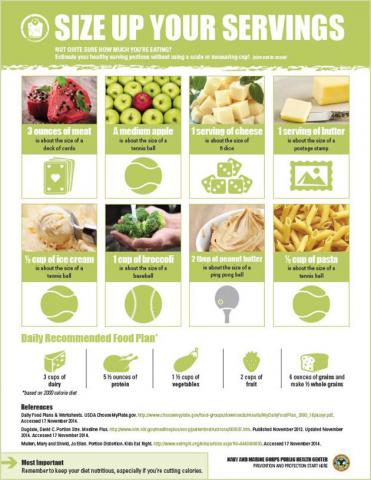Renew Your Commitment to Healthy Eating

Did you make a New Year's resolution to eat healthier in 2016? Even if you didn't make a resolution, it seems that every January many consumers intend to make healthy eating a priority. Unfortunately, resolutions and good intentions are easy to make but hard to fulfill. All of the conflicting nutrition information out there only makes it harder. Fortunately, the Navy and Marine Corps Public Health Center Health Promotion and Wellness Department is here to help.
We understand that as service members, retirees and family members, you face unique barriers to healthy eating. That's why we offer a variety of resources to help you make better food choices. March is National Nutrition Month, and it's as good a time as any to renew your commitment to healthy eating.
As members of our military community, you know the meaning of commitment. Your ability to fulfill your duties and support your family depends largely on your well-being. That's why it is important to renew your commitment to healthy eating so that you are at your personal and professional best at all times. For more information and tips on healthy eating, check out HPW Healthy Eating.
Food is fuel for the body. To be at your best, you need to eat nutrient-dense foods, such as whole grains, lean proteins, fruits, vegetables and low-fat dairy products. These power-packed foods contain the most vitamins and minerals, which provide you with quality energy for the least amount of calories. They also help reduce your risk of developing heart disease, high blood pressure, diabetes and several types of cancer while helping you maintain a healthy body weight and improve your peak performance.¹
Processed foods, such as pre-packaged, take-out and convenience foods often contain high amounts of calories, sodium (salt), added sugars and fat. Instead of eating processed foods, try preparing your meals at home. Healthy cooking can be easy and delicious. Check out our fact sheet on Mastering Healthy and Flavorful Cooking to learn more about how different techniques capture the flavor and increase the nutritional quality of your food. Another way to limit excessive calorie intake is to understand appropriate portion sizes, particularly when eating foods such as ice cream or potato chips. To find out exactly how much you're actually consuming, consult our fact sheet, Size Up Your Servings.
In addition to what you eat, you need to be aware of when and why you are eating. Do you eat when you're bored or stressed? Do you eat because you're happy or sad? Mindful eating is about paying attention to your hunger cues and your level of fullness. If you regularly make poor food choices or overeat, review our fact sheets on Eating with Food in Mind and the Tracker to Identify Your Food Triggers to help you improve your eating habits.
Resources
¹ Harvard School of Public Health. Obesity Prevention Source. Health Risks. http://www.hsph.harvard.edu/obesity-prevention-source/obesity-consequences/health-effects/. Updated 2015. Accessed February 2016.
